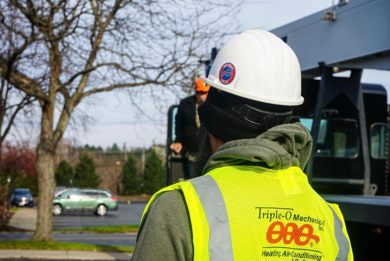When you combine water and metal, what do you get? You probably thought “rust,” but that’s not necessarily true. For corrosion to occur in metal (rust is a type of corrosion), it must be in contact with metal in the presence of oxygen. If you’ve ever wondered why your water heater—a metal device that holds water—doesn’t rapidly rust, the reason is that water heaters are designed to remove oxygen and/or direct contact between metal and water.
This doesn’t mean water heaters are impervious to corrosion. Far from it. Lack of maintenance can lead to corrosion setting in early on a water heater. But even with rigorous maintenance, a water heater can start to rust when it gets old enough. Does the appearance of rust mean that a water heater is done and needs to be replaced?
The General Answer Is “Yes”
If you have a water heater that is more than 12 years old and you see rust developing on it, then the best next step is to have the unit replaced. Most water heaters last for 10–12 years, so a water heater that’s already in the range has done its expected job. Corrosion indicates the device is wearing down to the point where maintenance and repairs will not do much good, so a replacement is the smartest move.
You don’t have to actually see rust on the water heater to know it’s got a corrosion problem. If you turn on hot water taps in the house and see a reddish discoloration in the water, that often means the water heater’s tank is rusting from the inside. This is almost certainly a sign to have the water heater replaced.
But There Are Exceptions
Corrosion on some parts of a water heater can be repaired by replacing the part. The heat exchanger is the main example. This is the metal part that transfers heat from the gas jets into the water tank. Rust on a heat exchanger is a serious problem that can create toxic gas leaks. You can have the heat exchanger replaced if it corrodes. However, please ask your technician about the advisability of continuing with your current water heater if it’s already in the upper range of its service life.
Keeping Away Corrosion
To ensure your water heater enjoys a full lifespan before corrosion sets in, always schedule annual maintenance for it. An essential part of regular water heater maintenance is checking on the sacrificial anode rod and replacing it when needed. This rod is a critical protection against water heater corrosion: the metal of the rod attracts oxidation to it so that it rusts first before any other part of the water heater, essentially “sacrificing” itself to rust so the water heater can continue to work. Once the rod is rusted through, it must be replaced or corrosion will begin to affect the rest of the unit.
Triple-O Heating, Cooling, Electrical & Plumbing Is Your One-stop Shop for HVAC, Plumbing and Electrical. If you’re looking for excellent water heater service in Rochester, NY, call on our team today!

